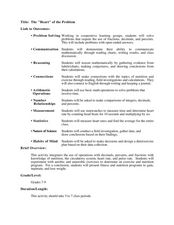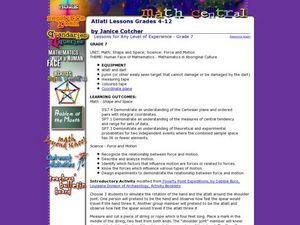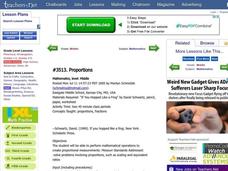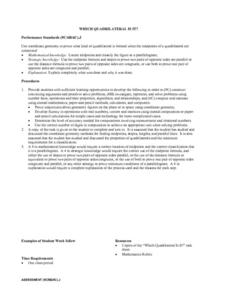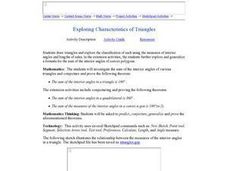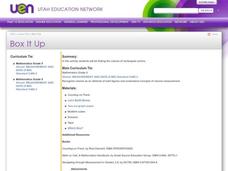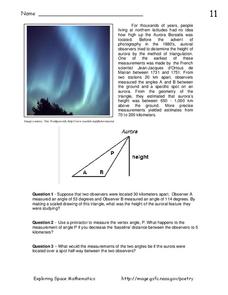Curated OER
The Stained Glass Window
Students use centimeter rulers and the attached worksheet containing a scale drawing of a stained glass window. The actual measurements of the stained glass window are given, and students are asked to find the actual measurement of the...
Curated OER
Electric Hoist Problem
Middle schoolers convert angle measures between degrees and radians. They are given a copy of the task sheet with a graphic to help describe the situation. Pupils review the angle and arc relationship in a circle related to length of...
Curated OER
What's My Pattern?
Students recognize, describe and extend patterns in three activities. They organize data, find patterns and describe the rule for the pattern as well as use the graphing calculator to graph the data to make and test predictions. In the...
Curated OER
Proportionality: Modeling the Future
Students explore and examine how patterns, measurement, ratios and proportions are utilized in the research development and production of airplanes. They meet a pilot from the Federal Aviation Association who describes the growth of air...
Curated OER
The "Heart" of the Problem
Students explore mathematical operations while studying nutrition. In this physical fitness lesson, students explore calories, pulse rate, and the circulatory system. Students use mathematical data to create a healthy physical fitness...
Curated OER
As Good As Gold
Students find examples of the Golden Ratio on the human body through measurement. Additionally, students learn about the use of the Golden Ratio and the Golden Rectangle in art and architecture. A very interesting lesson for the students!
Curated OER
Atlatl Lessons for Grade 7
Seventh graders examine force and motion. In this seventh grade mathematics/science lesson, 7th graders collect and analyze data regarding the use of an atlatl to throw a spear. Students describe and analyze the motion which leads to the...
Curated OER
Impedance
In this physics learning exercise, students complete 19 questions on impedance. They solve a series of mathematical and conceptual problems.
Curated OER
Series and Parallel AC circuits
In this AC circuits activity, students answer 75 questions about series and parallel circuits including building and analyzing their own circuit mathematically, interpreting schematics of AC circuits and finding total impedance of circuits.
Curated OER
How Much is a Million?
Students discover the magnitude of the number 100. The sense of the number is developed by allowing students to experience 100 by counting it, measuring it, feeling it, and doing it, hands-on
Curated OER
Proportions
Students perform mathematical operations to create proportional measurements, after listening to the David Schwartz book, If You Hopped Like a Frog.
Curated OER
Which Quadrilateral Is It?
Students prove conjectures about geometric figures on the plane or in space using coordinate geometry. They develop fluency in operations with real numbers, vectors and matrices using mental computation or paper-and-pencil calculations...
Curated OER
Exploring Characteristics of Triangles
Young scholars draw triangles and explore the classification of each using the measures of interior angles and lengths of sides. They investigate the sum of the interior angles of various triangles and conjecture and prove the theorem:...
Curated OER
Box It Up
Fifth graders make boxes. In this prisms lesson, 5th graders read the book Counting on Frank and discuss the different things that the boy measures. Students make boxes of various sizes using graph paper and find their volume.
Curated OER
When Life Serves You Lemons!
Learners build their own lemonade stand. In this problem solving lesson plan, students measure the materials needed to build a stand and make lemonade. They find the cost of producing the lemonade and the profit they will make.
National Council of Teachers of Mathematics
Varying Motion
For this secondary mathematics learning exercise, high schoolers collect data based on a person’s motion. From this data, students create graphs comparing displacement, velocity, and acceleration to time. The five-page learning exercise...
Curated OER
By the Pound, Gram Liter or Gallon
Students participate in experiments at five stations to practice measurement. In this measuring activity, students are presented different produce and objects and must measure with an appropriate tool. Students use metric and customary...
Curated OER
Positive and Negative Angles and Arcs
To better understand that the intersection point of two lines lies inside a circle, learners use their keen measurement skills. They discuss arcs, rays, tangent lines, and reflex angles. Then, they put their skills to work as they...
Curated OER
Aurora Borealis
In this Aurora Borealis learning exercise, students read about how early scientists used triangulation to measure the height of the Aurora Borealis. Students solve 3 problems using triangulation.
Curated OER
Data Scavenger Hunt
Eighth graders discuss how data is collected and participate in data collection through a survey. They complete a scavenger hunt on the Internet to gain understanding of the data measures mean, median, mode, and range.
Curated OER
Scaling Down Art
Students change the scale of a work of art using ratios, percentages, and proportions. While this is technically an art lesson, there is quite a bit of mathematics involved in converting to the correct scale.
Curated OER
Kitchen Math - Levels I & II
Identify appropriate abbreviations, food-measurement terminology, techniques, equivalents, and calculate recipe-size adjustments and demonstrate proper measuring techniques. Identify abbreviations Compute equivalents Identify measuring...
Curated OER
Picking Pythagoras
Students discover that side measurement is used in determining angle classification of a triangle. By squaring sides, they predict whether triangles be right, obtuse, or acute. They prove the Pythagorean Theorem and use it to solve...
Curated OER
Understanding Hurricanes and the ER-2
Students study hurricanes; in particular, what they look like, how they are formed, how they are categorized, how they are named, and how they are tracked. They examine the science of hurricanes as well as the mathematics of hurricanes.




